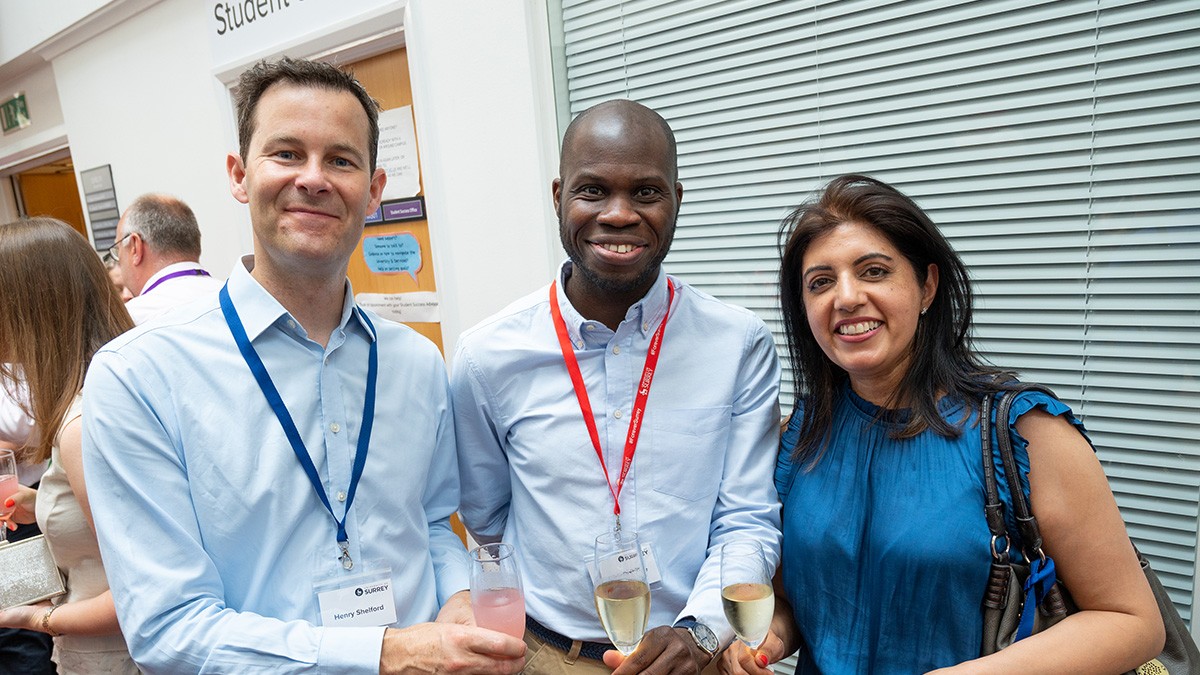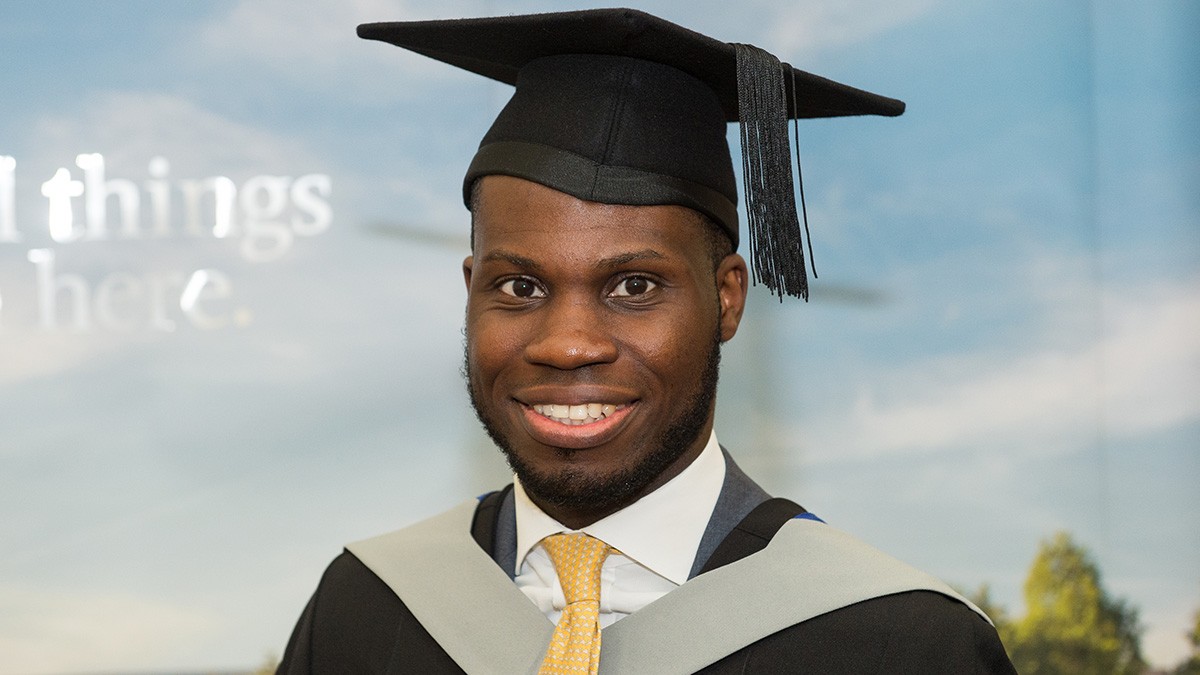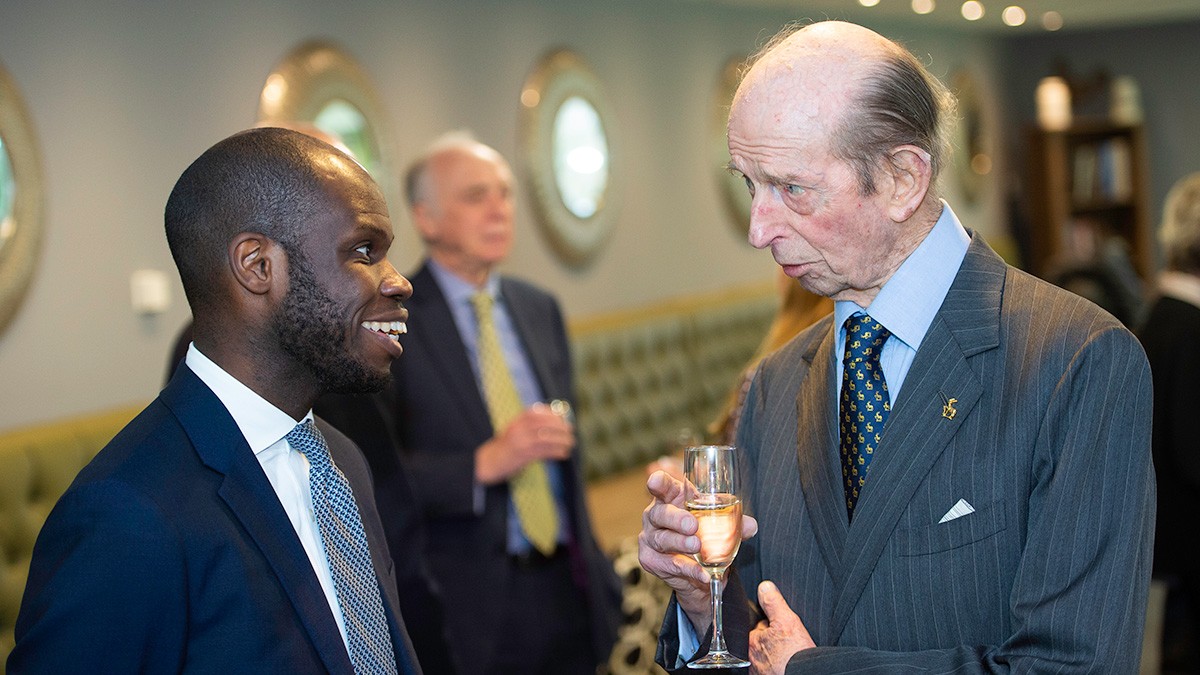“It’s incredible how lessons learnt at Surrey remain relevant”
Folarin Oyeleye arrived at Surrey via Nigeria and Dublin to study a BSc in Electronic Engineering from 2002. A President of our Students’ Union, he’s now a manager at JPMorgan…

"I’m still involved in supporting and raising money for the University," says Folarin, pictured here at the Scholars' Lunch
You arrived in Guildford via Nigeria and Ireland?
I moved from Lagos when I was 17 to go to boarding school in Dublin. The move between the two countries was tough at first. But I made good friends who had family in Ireland and they invited me to spend the weekend with them when we were allowed to leave school. I love Ireland. The people were welcoming and they had warm hearts. It did rain a lot, though.
When did you come to Surrey?
I started in 2002. There’s a two-year gap between me finishing in Dublin and starting at Surrey. I briefly thought I wanted to be a doctor, then I realised I didn’t want to do that.
I returned to Nigeria and I figured out I wanted to study electronic engineering. I researched taking a degree in the UK. Surrey had a good reputation and strong graduate employability.
I also wanted to study somewhere close to London but not in it. I had a discussion with my brother, who studied at a big university in London. He advised me to not study there because there were “too many distractions”. I wanted a campus university, too, after my brother pointed out the benefits of everything being in one contained and safe environment. So it was always Surrey for me.
How did you find it?
I loved it from day one, although there were a few things the online pictures didn’t prepare me for. For a start, I didn’t realise how elevated Guildford was. I stayed in University Court, which is at the bottom of Stag Hill. I had to walk up several inclines to get to my lectures or visit the library. That was a shock. I remember thinking, “Wow! I’m going to have to do this every day!”
That was balanced out by how friendly everyone was. In my experience, that’s always been a fantastic tradition at Surrey. That was important because I’d come to study in England via Nigeria and Dublin. I was also 21 when I started my degree, so I was in a different place to a lot of my undergraduate cohort.
What are your favourite memories of Surrey?
The Students’ Union played a big role in my time at the University. There wasn’t a corner of that building that I didn’t explore at some point. I have fond memories of that place. I had a lot of fun in there.
I have my brother to thank for that, too. He advised me, “Make sure you get involved in the Students’ Union.” Which is why I walked into the building on day one and asked a representative, “How can I participate?” I started as a volunteer, then I became a soft skills trainer and the President of the Afro-Caribbean Society. I became involved in events, then became the President of the Students’ Union from 2005-2006.
I made amazing friends on that journey. Several are like my family and we’re still in touch today. And it all started from that initial walk into the building and asking a simple question. It was the gift that just kept on giving.
Tell me a bit about your role as Students’ Union President…

Folarin recently returned to the University as a guest speaker at a graduation ceremony
It was a full-time job that students either do at the end of their degree or as a gap year during their course. I did my year after my course ended.
The role is to represent the student body to the University authorities, and at regional and national levels with the National Union of Students. At the same time, you’re in charge of an organisation that generates millions in revenue and employs between 30-40 staff. On any given day, you could be attending board meetings with senior University figures, planning finances or delivering strategy execution. It’s a unique job and an amazing opportunity to do all those things at a young age. Most people don’t experience that type of responsibility until they’re mid-career.
What achievement are you most proud of?
I overhauled the constitution of the Students’ Union and I believe today’s officers still use the bulk of what we created. I’m particularly proud of the work we did on representation. We put a lot of hours into that.
I remember working with the local community and the council on several projects, too. I even recall reviewing the initial plans for Manor Park campus and Surrey Sports Park. It’s amazing to see those places are a now a reality.
It also provided a good learning environment. There was one instance where I felt strongly about an issue and I thought this was how a lot of the student body felt about it. We ran a referendum and it turned out most people disagreed with me. Never making assumptions was an important lesson I learn there.
When did you complete your degree?
I finished my degree in 2005, but I had some issues paying my fees, so I didn’t get my degree certificate until 2006. That experience is one of the reasons I’ve always given to student hardship via the Forever Surrey Fund. I’ve done that ever since I’ve been in employment. Even if it’s just £10 a year, it will make a difference to somebody. I just about made it through. I want to help those coming behind me who may need additional support.
Did you have a clear career plan when you graduated?
I figured I wanted to work in finance, but I only wanted to do that for a few years. I had no idea where this decision would take me when I started at JP Morgan. But it’s been amazing and, 17 years later, I’m still at the same company.
What’s your current job?
I work in the London office in the Wealth Management Division. I lead a group of client advisers who report to me. It’s an interesting, challenging and exciting role. No two days are ever the same. That’s why I still do it.
Some of that links back to my experiences as the President of the Students’ Union at Surrey. There, I had to combine soft skills, such as active listening and managing people, with hard skills, like providing solutions to complex problems. Being able to employ strategic thinking to tasks at JP Morgan isn’t too far removed from what I learnt working in the Students’ Union. My engineering background also allows me to be a strong partner with the technology team as I understand the requirements of their roles.
It’s incredible how lessons learnt inside and outside the lecture theatre at Surrey are still relevant.
You’re on the board of the Future Says Surrey campaign. Can you tell me about that?

Folarin chatted to our Chancellor, HRH The Duke of Kent, at the launch of The Future Says Surrey fundraising campaign
When I was approached, I immediately said “Yes”. So many of the areas they’re raising money for align with my core values.
The focus on sustainability and the research we’re doing to tackle those issues is vital. The emphasis on supporting the student journey is also important to me. The student should be at the centre of everything that happens at Surrey because the institution doesn’t exist without those people. The part of the campaign that supports scholarships and hardship funding is particularly important to me.
How was the Scholars’ Lunch at the Surrey Weekender?
Sadly, it was the only part of the Weekender I attended as I had another commitment. The lunch was great. It gave donors a chance to meet the students their donations support.
If there’s another Surrey Weekender planned, I’m coming to the whole thing! Taking part in tours around campus, spending the weekend back in student accommodation and having fun in the Students’ Union… I’m not missing that opportunity again.
If you could time travel, what advice would you give to the undergraduate version of yourself?
I’d say, “Worry less because everything is going to be fine. The University has all the personal and professional tools in place to support you. And you’ll have plenty of time to worry about the big stuff later on.”
But I wouldn’t change anything. For example, I was a student caller on the first Telethon the University did to raise money in 2003. I was the highest-grossing fundraiser of the campaign, too. That idea of giving back stuck with me. Fast-forward 20 years and I’m still involved in supporting and raising money for the University.